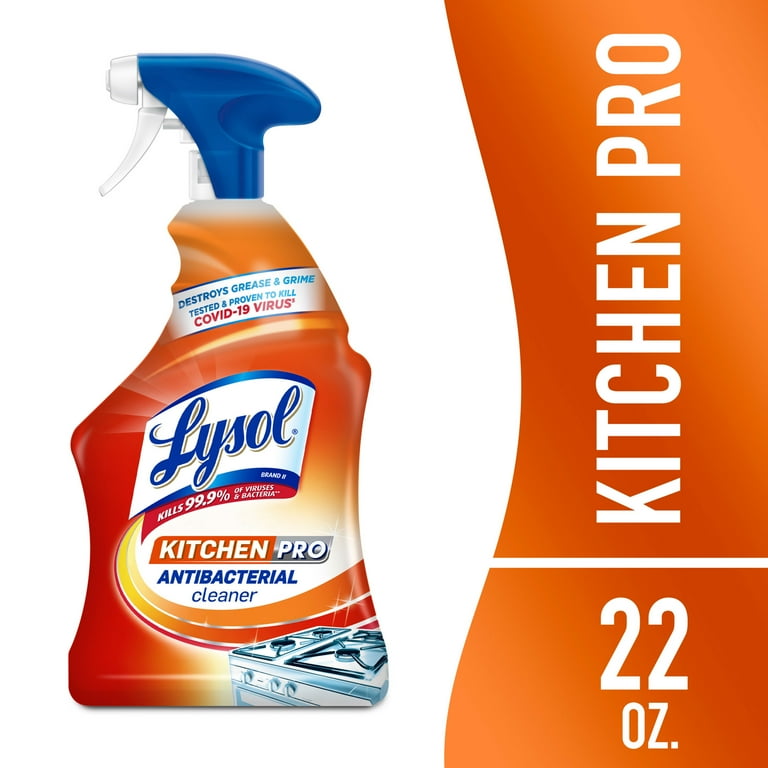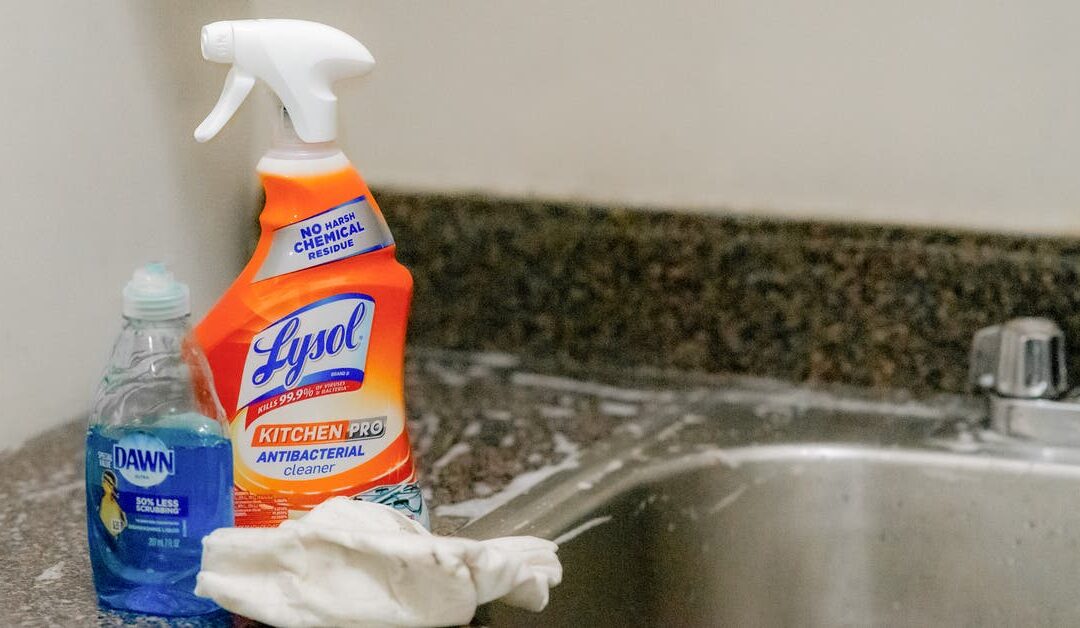When it comes to maintaining the beauty of your kitchen, your quartz countertops play a starring role. You want them to sparkle and shine, but you’re also cautious about using the right cleaning products.
You’ve probably heard of Lysol Kitchen Cleaner and wondered, “Can you use Lysol Kitchen Cleaner on quartz countertops? ” It’s a common question that can lead to confusion and even anxiety about potentially damaging your investment. This article is here to ease your mind and provide clear answers.
Get ready to discover the best practices for keeping your quartz countertops pristine without compromising their integrity. Plus, you’ll learn valuable tips that will make cleaning easier and more effective. Dive in to find out how you can keep your kitchen surfaces gleaming with confidence!

Credit: www.walmart.com
Understanding Quartz Countertops
Quartz countertops are a popular choice for modern kitchens due to their durability and aesthetic appeal. But if you’re wondering whether you can use Lysol Kitchen Cleaner on quartz, you first need to understand what makes these countertops unique. Let’s dive into the composition and characteristics, and common uses in kitchens.
Composition And Characteristics
Quartz countertops are engineered from a mix of natural quartz stone and synthetic materials. This blend gives them a unique combination of strength and beauty.
The high quartz content makes these surfaces hard, and the resin binders add flexibility. This means they’re less likely to chip or crack compared to natural stone options like granite.
Another noteworthy characteristic is their non-porous nature. This makes quartz countertops resistant to stains, which is a blessing in a busy kitchen.
You’ll notice they have a consistent color and pattern, which is a result of the manufacturing process. If you’re someone who enjoys uniformity, quartz is an excellent choice.
But here’s a question for you: How do you balance cleaning efficiency and surface protection? It’s crucial to choose cleaning products that won’t damage this intricate composition.
Common Uses In Kitchens
Quartz countertops are often the centerpiece of kitchen designs. Their sleek finish complements various styles, from rustic to contemporary.
Besides aesthetics, quartz is functional. You can use it for chopping, rolling dough, and even serving hot dishes. The surface handles it all, making life easier.
Think about the last time you hosted a dinner party. The quartz countertop can be your ally—easy to clean spills, and withstanding the heat from hot pans.
Consider the frequency of use when selecting cleaning products. Quartz is durable, but using the wrong cleaner repeatedly could dull its finish over time.
So, before you grab that Lysol bottle, ask yourself: Is it safe for the surface you cherish? Understanding quartz will help you make the right choice.
Lysol Kitchen Cleaner Ingredients
Understanding the ingredients in Lysol Kitchen Cleaner is crucial. It helps determine its suitability for quartz countertops. Knowing the components ensures safe usage on various surfaces.
Active Components
Lysol Kitchen Cleaner contains powerful active ingredients. The primary component is hydrogen peroxide. This compound effectively removes dirt and bacteria. It also has surfactants. They break down grease and grime. These ingredients work together to clean surfaces thoroughly.
Intended Surfaces
Lysol Kitchen Cleaner is versatile. It’s designed for kitchen surfaces. It works on countertops, sinks, and appliances. The cleaner is safe for stainless steel. It’s also effective on ceramic and tile. Quartz countertops require special care. Ensure compatibility before using on quartz.
Safety Concerns
Quartz countertops are popular for their durability and sleek look. But safety is key when cleaning them. Not all cleaners are safe for quartz. Using the wrong product can lead to damage. It’s important to know what works and what doesn’t.
Lysol Kitchen Cleaner is common in many homes. But can it be used on quartz? Let’s explore the potential risks and manufacturer advice.
Potential Damage To Quartz
Quartz is strong but not invincible. Harsh chemicals can harm its surface. Lysol Kitchen Cleaner may contain substances that are too abrasive. This can lead to dull spots or discoloration. Acidic or alkaline cleaners are risky for quartz.
Quartz can lose its shine if cleaned improperly. Scratches can appear. Sealants may break down. It’s crucial to choose the right cleaner to keep quartz looking its best.
Manufacturer Recommendations
Manufacturers often provide guidelines on cleaning quartz. Many suggest using mild soap and water. They advise against using strong chemical cleaners. Lysol Kitchen Cleaner might not be recommended.
Reading the manufacturer’s instructions is vital. They know their product best. Following their advice helps maintain the countertop’s integrity.
Check the cleaner’s label for compatibility. Some products are safe for quartz. Others are not. Always prioritize the manufacturer’s advice for cleaning quartz surfaces.
Alternative Cleaning Solutions
Quartz countertops are a stunning and durable choice for any kitchen. Their beauty and resilience make them a popular option. While maintaining their shine, it’s crucial to use the right cleaning solutions. Some cleaners can damage the surface. It’s important to explore alternatives. Let’s dive into some quartz-safe options.
Quartz-safe Products
Many products cater specifically to quartz surfaces. These cleaners are designed to maintain the quartz’s integrity. Look for labels that clearly state “quartz-safe.” These products often have a neutral pH. They clean without causing harm. Brands like Granite Gold and Weiman offer reliable options. Regular use keeps your countertop looking new.
Diy Cleaning Methods
Homemade solutions can also be effective. Mix mild dish soap with warm water. Use a soft cloth to apply the mixture. Gently wipe the surface in circular motions. Avoid using abrasive pads. They can scratch the quartz. For stubborn stains, use a paste of baking soda and water. Let it sit for a few minutes. Then, gently scrub with a soft cloth.
Vinegar should be avoided on quartz. Its acidity can damage the surface. Always rinse thoroughly with water after cleaning. This prevents any residue from lingering.
Best Practices For Quartz Maintenance
Quartz countertops need gentle care to maintain their shine. Lysol Kitchen Cleaner is safe for quartz surfaces. Avoid abrasive pads to prevent scratches.
Maintaining the beauty and durability of quartz countertops requires some thoughtful care. While quartz is known for its resilience, improper maintenance can lead to dullness or damage. The good news is that with the right practices, you can keep your countertops looking as stunning as the day they were installed. Let’s dive into some best practices for maintaining your quartz surfaces effectively.Regular Cleaning Tips
Regular cleaning is essential for keeping quartz countertops in top condition. Use a soft cloth or sponge with mild dish soap and warm water. This simple routine helps remove everyday spills and crumbs without harming the surface. Avoid using harsh chemicals or abrasive pads, as they can scratch or dull the finish. You might be tempted to use strong cleaners for stubborn stains, but a gentle approach works best for quartz. For tougher spots, a mixture of baking soda and water can often do the trick without damaging the surface.Preventing Surface Damage
Protecting quartz from potential damage is crucial to maintain its shine. Always use cutting boards when chopping vegetables to prevent scratches. Although quartz is tough, direct cuts can leave marks over time. Be mindful of hot items such as pots and pans. Placing them directly on the countertop can cause thermal shock and lead to cracks. Use trivets or heat pads to shield your surface from heat damage. Consider how everyday habits affect your countertops. Do you often spill coffee or wine? Wipe them off promptly to prevent staining. This simple habit can save you from dealing with unsightly marks. Quartz maintenance doesn’t have to be complicated. By adopting these regular cleaning tips and damage prevention strategies, you can enjoy your beautiful countertops for years to come. What changes can you make today to ensure your quartz stays pristine?
Credit: www.homedit.com
Expert Opinions
Many homeowners wonder about using Lysol Kitchen Cleaner on quartz countertops. Expert opinions can provide clarity. This section delves into insights from quartz manufacturers and cleaning expert recommendations.
Insights From Quartz Manufacturers
Quartz manufacturers emphasize the importance of using gentle cleaners. They design quartz surfaces to be durable and non-porous. Yet, harsh chemicals can cause damage. Lysol Kitchen Cleaner contains strong ingredients. Manufacturers advise caution. They recommend checking if the product is safe for quartz.
Some manufacturers provide a list of approved cleaners. These cleaners are tested for safety and effectiveness. It’s always wise to consult these lists. They ensure the longevity of your quartz countertops.
Cleaning Expert Recommendations
Cleaning experts often share their insights. They suggest using mild soap and warm water for quartz. This method prevents damage and keeps surfaces clean. They also advise against using cleaners with bleach or ammonia. These ingredients can harm the quartz finish.
Experts recommend testing any cleaner on a small area first. This test can reveal any adverse reactions. If Lysol Kitchen Cleaner must be used, rinse the area thoroughly. This step removes any residue that could harm the surface.
In short, experts prioritize safety and longevity. They suggest gentle methods and caution with strong chemicals.

Credit: marble-concepts.com
Frequently Asked Questions
Is Lysol Kitchen Cleaner Safe For Quartz?
Lysol Kitchen Cleaner can be used on quartz countertops, but caution is advised. It’s best to test a small area first. Some quartz manufacturers recommend avoiding harsh chemicals to maintain the surface’s integrity. Always refer to the quartz countertop care instructions for specific guidance.
Can Lysol Damage Quartz Countertops?
Using Lysol Kitchen Cleaner occasionally shouldn’t damage quartz countertops. However, frequent use might lead to dullness or discoloration. It’s wise to use mild cleaners or warm soapy water for regular maintenance. Ensure to rinse thoroughly to prevent residue buildup.
What Cleaners Are Best For Quartz?
Mild dish soap and warm water are ideal for cleaning quartz countertops. Avoid abrasive or acidic cleaners which can damage the surface. Specialized quartz cleaners are available for more stubborn stains. Regular cleaning with gentle products ensures long-lasting shine and durability.
How To Clean Quartz Countertops Safely?
To clean quartz safely, use a soft cloth with warm soapy water. Avoid scrubbing as it might scratch the surface. Rinse and dry thoroughly to prevent water spots. For tough stains, use gentle quartz-specific cleaning products or consult the manufacturer’s guidelines.
Conclusion
Lysol Kitchen Cleaner can be used on quartz countertops carefully. Check the label first. Some cleaners may harm the surface. Always test on a small area. Use a gentle cloth, not harsh pads. Cleaners with bleach can damage quartz. Vinegar is not ideal for quartz either.
Stick to mild soaps and water for regular cleaning. Regular care keeps countertops shining. Protects the investment in your home. Clean spills quickly to avoid stains. Keep your quartz beautiful and strong for years.

As the chief content writer, Hassan Al Sarker works as a professional kitchen-based content creator at Kitchen Liker.
In addition to reviewing the content published on Kitchen Liker, he ensures that it is accurate, relevant, and helpful. As a result, all the reviews and information published at Kitchen Liker are neutral and userfriendly.
Hassan Al Sarker has a bachelor’s degree in Hotel and Tourism Management From the Newyork University. Before joining Kitchen Liker, he was a contributor at Kitchen Club, United States.

